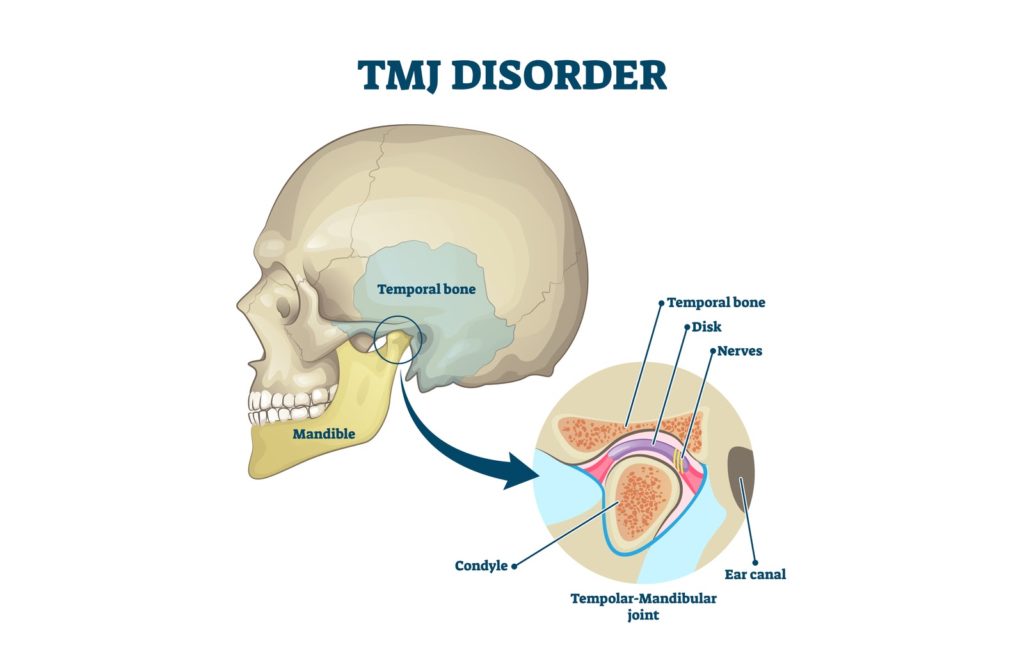Do you have jaw pain? Do you have trouble chewing? Do you notice a clicking in your jaw when you talk? These are all signs that you may be suffering from a temporomandibular disorder or TMJ.
Although common, TMJ is challenging to diagnose because there are many different causes and symptoms.
The good news is, you’re not alone. Approximately 5-12% of people experience pain related to TMJ, and many of these people can find relief after being correctly diagnosed and treated.
What is TMJ?
TMJ is a disorder that affects the temporomandibular joints, which are the two joints on either side of your face that connect your lower jaw to your skull. These joints allow the jaw to move and are responsible for chewing, talking and yawning. If there are issues with the alignment or functionality of these joints, it can result in a TMJ.
The National Institute of Dental and Craniofacial Research classifies TMJ into three main categories:
Myofascial Pain TMJ
Myofascial pain is the most common form of TMD and involves the discomfort or pain in the muscles that control the jaw, neck and shoulders.
Joint Misalignment TMJ
This form of TMJ occurs when the joints in the jaw are displaced, which can be due to genetics or injury.
Joint Disease TMJ
Joint disease TMJ can cause pain or impede mobility due to diseases that affect the joint itself, such as osteoarthritis or rheumatoid arthritis.
Unfortunately, people who suffer from TMJ can suffer from one or more of these conditions simultaneously.

What Causes TMJ?
There is still a lot unknown about TMJ disorder, and causes vary significantly on an individual basis. Some of the common causes that are linked to TMJ disorder include:
- Trauma to the jaw or joint
- Natural erosion of the joint causing misalignment
- Medical conditions such as arthritis
- Clenching of the jaw muscles due to stress
- Grinding your teeth (also called bruxism)
- Structural jaw problems present at birth
In addition to the above causes, several other causes are often associated with the disorder but have yet to be proven to cause TMJ. These include:
- Poor posture
- Orthodontics
- Poor diet
- Prolonged lack of sleep
Symptoms
The symptoms of TMJ disorders depend on the severity and cause of your condition. Potential signs and symptoms of TMJ disorders may include:
- Pain or tenderness of your jaw, face or temporomandibular joints
- Aching pain in and around your ear
- Difficulty chewing or pain while chewing
- Locking or “clicking” of the jaw
- Stiffness in the muscles of the jaw
- Limited movement of the jaw
If you suffer from TMJ, you may notice these symptoms on just one or both sides of the face or jaw.
When To See A Doctor
You should seek medical attention if you have prolonged pain or tenderness in your jaw or have minimal jaw movement and notice it getting worse with time. Your dentist or a TMJ specialist can discuss possible causes and treatments based on your symptoms.
What are the Risk Factors of TMJ?
Factors that may increase the risk of developing TMJ disorders include:
- Medical conditions such as arthritis
- Long-term grinding or clenching of the teeth
- Certain connective tissue diseases that affect the temporomandibular joints
How is TMJ Diagnosed?
To be diagnosed with TMJ, you will need to see a dentist, doctor or a TMJ specialist. Your practitioner will discuss your symptoms and examine your jaw. This examination typically includes:
- Observing your jaw when you open and close your mouth
- Testing the range of motion in your jaw
- Pressing on areas around your jaw to identify pain points
After this examination, your practitioner has several options to aid them in diagnosing the severity of your disorder. These may include:
How is TMJ Treated?
TMJ is typically treated through medications, therapy or medical procedures.
Medications
If you experience pain due to your TMJ disorder, over-the-counter or prescribed medication may be a suitable enough treatment option for you.
Certain medications, such as tricyclic antidepressants, can help prevent some of the common factors that may be causing your TMJ. These medications can help to lower stress or control jaw clenching, which can lessen your symptoms, making your TMJ more manageable.
Therapies
Standard therapies that may lower the effects of your TMJ disorder include:
- Physical therapy– From physical exercises meant to strengthen your jaw muscles to the use of oral mouthguards, physical therapy may aid in the management of your TMJ disorder.
- Counselling- Counseling can help you understand habits and behaviours that may aggravate your TMJ disorder. When you become aware of these habits, you can adjust them, and you may see your TMJ disorder improve.
Surgical or other procedures
If your TMJ disorder is severe enough, your medical practitioner may recommend any one of the following surgeries or medical procedures:
- Joint aspiration (or arthrocentesis)
- Injections
- TMJ arthroscopy
- Modified condylotomy
- Open-joint surgery
The Takeaway
TMJ disorders cover a wide range of causes and symptoms. Because of this, there are several treatment options available. The best way to identify how to treat your TMJ disorder is by getting a proper examination and diagnosis from your dentist, doctor or TMJ specialist.
If you think you may have TMJ or have any questions or concerns, contact us today!



